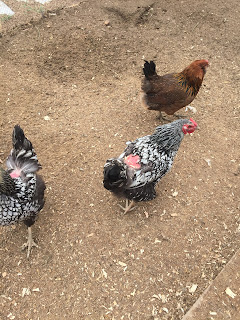As part of our new place, we inherited a flock of chickens. Which means the Alpacamundo Farm currently has Alpaca, Tibetan Mastiffs, Nigerian Dwarf Goats, and Chickens.
The First Year with Chickens

There were 16. Three of which were Roosters.

The ratio should be closer to 1 Rooster per 15 Hens. So the laying hens had large bald spots due to being over-bred by too many roosters and the roosters had been fighting with each other.

With the help of a Chicken Farmer Friend we identified which Rooster to keep, and began making plans to cull the other two. However, due to a series of predation events we lost 2 roosters, including the one we wanted to keep, and gave the third to our neighbor.
The good news is that this all happened in time for the remaining hen-flock to re-grow feathers before the cold weather of winter.

I spent the winter improving the health of the flock.... adding calcium, grit, and higher protein organic feed, as well as treating for mites.

By the time laying resumed in the spring, the egg shells were quite hard for all but one of the hens, and everyone was looking good.

We had a lovely summer with the flock of 8 hens. They did a great job of keeping the grass hopper and other bug populations under control. As well as pooping all over the sidewalk and being a great source of entertainment. :-)
Making Plans for the Future Flock
A couple of weeks ago, Hubba and I started talking about adding birds to the flock. We began studying the Livestock Conservancy's Priority List to start figuring out which breeds would be good for our area and goals. The plan was to add chicks in November/December so they would be old enough to start laying in the spring.
Then due to a mistake on my part, we lost all but one of our flock to predation just before dawn, on Monday. FYI, this is a terrible way to be woken up. :-(
Clearly we needed to make some process changes, and get a small flock together ASAP. The one remaining chicken, Fluffy Face, was stressed being by herself.
Another friend offered to give us a few older-adult hens, but it would be a week before we could get together So for the intervening week.... I found and purchased live chicks from a local ranch-supply store on Monday afternoon, and dove head first into caring for baby chickens. ack.
Baby Chickens
My hope is that the chicks, while in their own area inside the coop, will be enough for Fluffy Face to feel more comfortable until the adults arrive next weekend.
Monday was a stressful day for her, with a lot of changes. So she was suspicious of the new equipment in the coop.


At the midday Tuesday (yesterday) checks, Miss Fluffy Face was watching the chicks. All of the chicks are eating and drinking.... and Miss Fluffy Face seems a bit more relaxed now too.


Day 3
Today is Wednesday and we have two nights under our belt.... Fluffy Face is becoming more interested in spending time with the chicks.
I've been handling the chicks a little each time I go out to the coop. This is to encourage them to trust me and eventually be easy to catch and vet when needed.
As of today, the chicks are officially 1 week + 2 days old!
They are Rhode Island Red, which are on the Livestock Conservancy's Priority List. Though, I suspect these are "industrially" produced.
At this point I don't know if I have hens, roosters, or a combination. The producer endeavors to provide only hens, but it is not guaranteed. According to what I've read, I should have a good idea by about 6-14 weeks.
Next time I, hopefully, will be able to talk about successfully introducing a flock of adult chickens. *fingers crossed.*

No comments:
Post a Comment